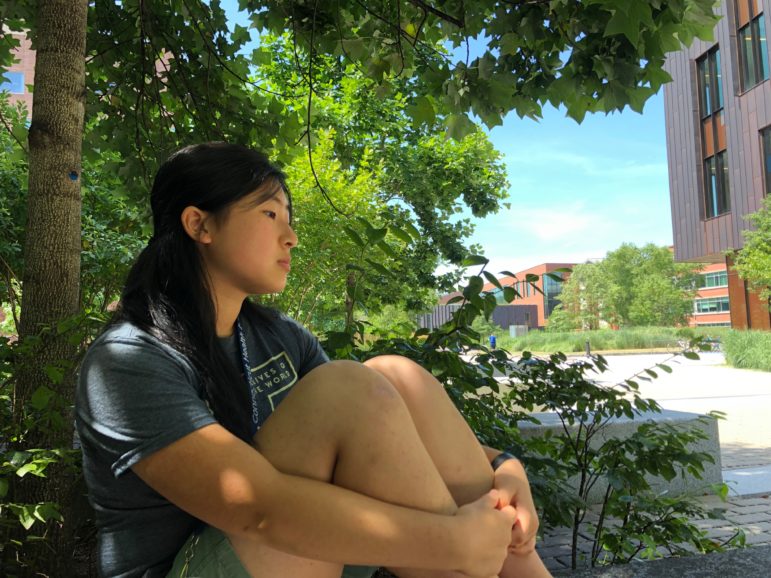About 26% of young adults 18-25 years old have a mental health issue, but only 38% of those affected actually receive treatment, according to the National Institute of Mental Health.
Colleges across the U.S. have felt the weight of the statistics. Counseling centers are flooded by an increasing demand for a limited amount of mental health resources, resulting in students getting placed on waitlists.
At times, students are turning toward e-communities, particularly ones on Instagram, for support and recovery. Many accounts are dedicated to raising awareness and offering support for eating disorders, anxiety, and depression.
Instagram users communicate and bond through their captions, stories, and private messages on their mental battles and physical struggles. Most actively participate recovery accounts, while others just view content for inspiration.

Rachel Lindsay photo
Serene Feng
“There has also been more awareness about mental illness in the online community, such as through Mental Health Awareness Week. Many students will turn towards social media as an outlet and way to get support for their mental health struggles,” says Danielle Cai, a college sophomore in New York City. One of her friends used Instagram to recover from an eating disorder and successfully found support and motivation along her journey.
“I know a few college students, specifically females and members of the LGBTQIA+ community, use different social media platforms and online magazines for inspiration to deal with their mental health issues…I primarily see people use it to help deal with eating disorders, depression, and anxiety,” says Claire Xu, a college senior in Ohio.
But Sandra Chafouleas, a psychology professor at the University of Connecticut, said, “Although there are certainly many positive benefits to using social media [including accessibility], it doesn’t mean it is the right or best choice for your particular situation…It is important to understand the match to your needs as a mismatch could end up creating worse outcomes.”
Around 75% of 18-24 year olds use Instagram, a social media platform on which users share photos with captions up to 2,200 characters (300 words) along with “stories” that capture casual moments. Its organization preserves content relevance which further promotes engagement.
The recovery communities on Instagram have utilized its features in contributing daily encouragement and advice; they reinforce ideas with each interaction similar to how each face-to-face contact shapes a person’s outlook.
“…I see more people following accounts that talk about overall mindset and aren’t illness specific,” says Xu.
Elizabeth Dordelman, a recent college graduate from Pennsylvania who now lives in New York City, said, “I do have a lot of college girls follow me on my [Instagram] page who can relate to posts about mental health and eating disorders especially. I think it gives them hope to look up to someone who has been in their position before, even if they aren’t ready to share their story yet…”
The genuine reappraisal that Instagram communities foster is what attracts participation. They receive feedback from others, whether through posting or commenting; this often involves rebuttals and the sharing of alternative pathways and perspectives.
“There’s so many e-communities as well in the health and wellness Instagram sphere that have really grown to foster connection between vulnerable young women who need others to relate to in their struggles,” says Dordelman.
Registered dietitians, eating disorder specialists, clinical psychologists, mental health coaches, and even researchers and doctors have their spheres on Instagram from which they contribute.
Reappraisal Study
In 2015, MIT and Northwestern University conducted a study on depression that evaluated online peer-to-peer reappraisal using Panoply, a platform on which participants posted their own experiences with depression and exchanged feedback.
The study found “that repeated use of our system (Panoply) produced significant benefits, particularly for depressed individuals and for those who typically underutilize reappraisal strategies. We believe Panoply conferred benefits because it taught reappraisal skills.”
Panoply produced significantly higher engagement and usage rates than the “expressive writing” group that did not participate in reappraisal, the study reported.
Social media has long been under fire for being the root cause of depression and anxiety cases among young adults due to the comparison and isolation it precipitates.
But it does offer interest-specific social interaction that would otherwise be difficult to find or access.
Pitfalls: Caution and Shortcomings
But depending on your illness and recovery stage, e-communities can be misleading.
Chafouleas said, “For example, a serious crisis like suicidal ideation may not be best addressed through a mood meter app. In such a case, the person needs to recognize the need to call or go immediately for in-person help…that same mood meter app might be a great tool to help you make a behavior change [and] help you find patterns in your behavior that need strengthening. Related, if you are a person on the other end, it is really important that you acknowledge those signs and tell someone/get help.”
“For some, it’s triggering…[and] they may steer away from e-communities while in recovery,” says Cai.
“I think it is useful for many, but only if the student truly wants to make a change on their own,” says Xu.
The study “The Effect of Eating Disorder Memoirs in Individuals With Self-Identified Eating Pathologies” uncovered the roles an individual’s recovery stage and motivation play in their reaction to memoirs.
The memoirs had content similar to on Instagram. Most in the later stages of recovery found the memoirs to be validating and reassuring, while most who were still in their illnesses were triggered to relapse and normalize their sickness.
Chafouleas said that students should critically analyze the credibility of the advice shared online, as their influence is far-reaching and powerful.
Serene Feng lives in Manchester and is home-schooled.